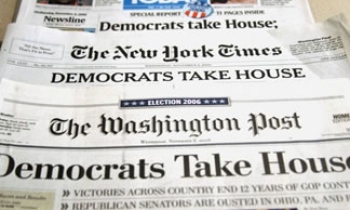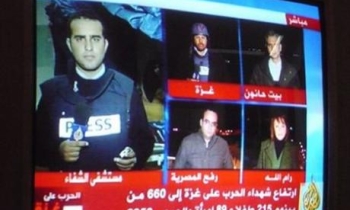COPENHAGEN, Feb. 11, 2006 – For decades, the Christiania neighborhood here was an informal symbol of Danish tolerance – a leafy district dotted with hippie communes and stalls where people could openly buy and smoke marijuana despite nominal laws against it.
But today the stalls are empty and the revelers have gone home. Many here see the change as indicative of a societywide shift that has also brought rising support for the Danish People's Party, a staunchly conservative anti-immigrant party that holds 13 percent of seats in the Danish Parliament and that has pushed for cleaning up Christiania with the same zeal it has used to fight Denmark's openness to Muslim immigrants.
Now, after rioting that has raged for weeks across the Muslim world after a Danish newspaper's publishing of caricatures of the Prophet Muhammad, Denmark has sunk even more deeply into an identity crisis. A country that once prided itself on having Europe's most open immigration policies and a generous welfare state is grappling with how to preserve its vaunted liberalism while remaining Danish.
"The furor over the cartoons has been a wake-up call for Danes," says Flemming Rose, the cultural editor of the paper, Jyllands-Posten. Mr. Rose, who commissioned the cartoons in the fall, announced Friday that he was taking an indefinite leave of absence from the paper. "We are used to seeing ourselves as a permissive and open society on the side of the good, and it is shocking to see Danes as objects of hate."
He continued, "People are no longer willing to pay taxes to help support someone called Ali who comes from a country with a different language and culture that is 5,000 miles away."
Such feelings have been evident across Europe, from the backlash against starting negotiations to admit Muslim Turkey into the European Union to a new bill proposed this week in France that would make it harder for low-income immigrants to bring in relatives.
But the cultural clash is particularly acute in Denmark. As Muslim protesters across the Middle East burned Prime Minister Anders Fogh Rasmussen in effigy this week, he insisted on Denmark's tolerance. "It's a false picture to portray us as an enemy of Islam," he said in an interview on Thursday.
But Muslim leaders have pointed out that such words fail to resonate when the government coalition includes the Danish People's Party, whose leaders have publicly compared Muslims to "cancer cells."
A country that touts itself as the world's biggest net contributor per capita of foreign aid recently introduced legislation making it virtually impossible for torture victims to obtain Danish citizenship. Successful asylum applications to Denmark plummeted to 10 percent last year, from 53 percent.
In a sign that the cartoon crisis is fanning even greater anti-immigrant sentiment, the People's Party leader, Pia Kjaersgaard, wrote in her weekly newsletter that the Islamic religious community here was populated with "pathetic and lying men with worrying suspect views on democracy and women." She added: "They are the enemy inside. The Trojan horse in Denmark. A kind of Islamic mafia."
Imam Abdul Wahid Pedersen, a Danish convert to Islam, with ice blue eyes and a neatly trimmed goatee, argues that Denmark's self-delusions have been destroyed by the cartoons. Imam Pedersen, who converted 24 years ago and speaks fluent Arabic, says that before the cartoon crisis his Muslim identity was embraced by Danish friends. Now he says he is taunted as a "traitor" as he walks down the street and has even received death threats.
"Blockhead right-wing politicians in this country are saying Islam is a terrorist religion, that our prophet is a con man, that we take their jobs and steal their women," he said. "The tolerance it took decades to build up has been torn down in a matter of a few months."
The Danish People's Party insists that the violence spurred by the cartoon crisis has proved that its anti-immigration policies are justified. Morten Messerschmidt, a 25-year-old rising star in the party, said that rather than preaching intolerance, the party was in fact fighting to preserve Danish liberalism – including respect for gender rights and freedom of the press – which he believes has become increasingly irreconcilable with Islam.
"The crisis over the cartoons has been an eye-opener and has shown that the culture clash we have been predicting for 10 years had come to pass," Mr. Messerschmidt said. "These people we welcomed into our country have betrayed us."
Mr. Messerschmidt said the clash of civilizations spurred by the Muhammad cartoons had drawn new supporters to the party, which some opinion polls say has gained about 3 percent more popular support since January. Political analysts attribute the gain to Danes' anger that a group of Danish imams has been touring the Arab world and stirring up resentment by displaying the caricatures, including a depiction of Muhammad as a pig that was never published in a Danish newspaper. Violent protests have prompted Denmark to withdraw its ambassadors from Iran, Indonesia, and Syria.
Imam Pedersen says the increasingly frequent depiction of Muslims as radicals and terrorists in the Danish news media distorts the fact that 80 percent of Denmark's Muslims, drawn from countries like Turkey, Pakistan, Iran and Somalia, are not members of political or religious groups. Only 5 percent describe themselves as religious, he said. But he warns that the "stigmatization of Muslims in this country risks turning the cliché of the radical Muslim into a reality."
Soren Krarup, the Danish People Party's spokesman on immigration, said in a recent interview that the furor over the Muhammad caricatures could result in a further tightening of immigration policies. He added that the party was considering sponsoring a measure to freeze Muslim immigration altogether.









